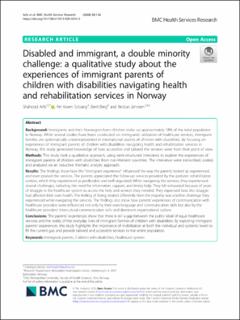| dc.contributor.author | Arfa, Shahrzad | |
| dc.contributor.author | Koren Solvang, Per | |
| dc.contributor.author | Berg, Berit | |
| dc.contributor.author | Jahnsen, Reidun Birgitta | |
| dc.date.accessioned | 2022-12-08T11:35:56Z | |
| dc.date.available | 2022-12-08T11:35:56Z | |
| dc.date.created | 2021-01-12T12:54:17Z | |
| dc.date.issued | 2020 | |
| dc.identifier.citation | BMC Health Services Research. 2020, 20 (1), 1-16. | en_US |
| dc.identifier.issn | 1472-6963 | |
| dc.identifier.uri | https://hdl.handle.net/11250/3036743 | |
| dc.description.abstract | Background
Immigrants and their Norwegian-born children make up approximately 18% of the total population in Norway. While several studies have been conducted on immigrants’ utilization of healthcare services, immigrant families are systematically underrepresented in international studies of children with disabilities. By focusing on experiences of immigrant parents of children with disabilities navigating health and rehabilitation services in Norway, this study generated knowledge of how accessible and tailored the services were from their point of view.
Methods
This study took a qualitative approach, using semi-structured interviews to explore the experiences of immigrant parents of children with disabilities from non-Western countries. The interviews were transcribed, coded, and analyzed via an inductive thematic analytic approach.
Results
The findings show how the “immigrant experience” influenced the way the parents looked at, experienced, and even praised the services. The parents appreciated the follow-up services provided by the pediatric rehabilitation centers, which they experienced as predictable and well-organized. While navigating the services, they experienced several challenges, including the need for information, support, and timely help. They felt exhausted because of years of struggle in the healthcare system to access the help and services they needed. They expressed how this struggle had affected their own health. The feeling of being treated differently from the majority was another challenge they experienced while navigating the services. The findings also show how parents’ experiences of communication with healthcare providers were influenced not only by their own language and communication skills but also by the healthcare providers’ intercultural communication skills and dominant organizational culture.
Conclusions
The parents’ experiences show that there is still a gap between the public ideal of equal healthcare services and the reality of the everyday lives of immigrant families of children with disabilities. By exploring immigrant parents’ experiences, this study highlights the importance of mobilization at both the individual and systemic levels to fill the current gap and provide tailored and accessible services to the entire population. | en_US |
| dc.language.iso | eng | en_US |
| dc.publisher | BMC | en_US |
| dc.rights | Navngivelse 4.0 Internasjonal | * |
| dc.rights.uri | http://creativecommons.org/licenses/by/4.0/deed.no | * |
| dc.title | Disabled and immigrant, a double minority challenge: A qualitative study about the experiences of immigrant parents of children with disabilities navigating health and rehabilitation services in Norway | en_US |
| dc.title.alternative | Disabled and immigrant, a double minority challenge: A qualitative study about the experiences of immigrant parents of children with disabilities navigating health and rehabilitation services in Norway | en_US |
| dc.type | Peer reviewed | en_US |
| dc.type | Journal article | en_US |
| dc.description.version | publishedVersion | en_US |
| dc.source.pagenumber | 1-16 | en_US |
| dc.source.volume | 20 | en_US |
| dc.source.journal | BMC Health Services Research | en_US |
| dc.source.issue | 1 | en_US |
| dc.identifier.doi | 10.1186/s12913-020-5004-2 | |
| dc.identifier.cristin | 1869788 | |
| cristin.ispublished | true | |
| cristin.fulltext | original | |
| cristin.qualitycode | 2 | |

